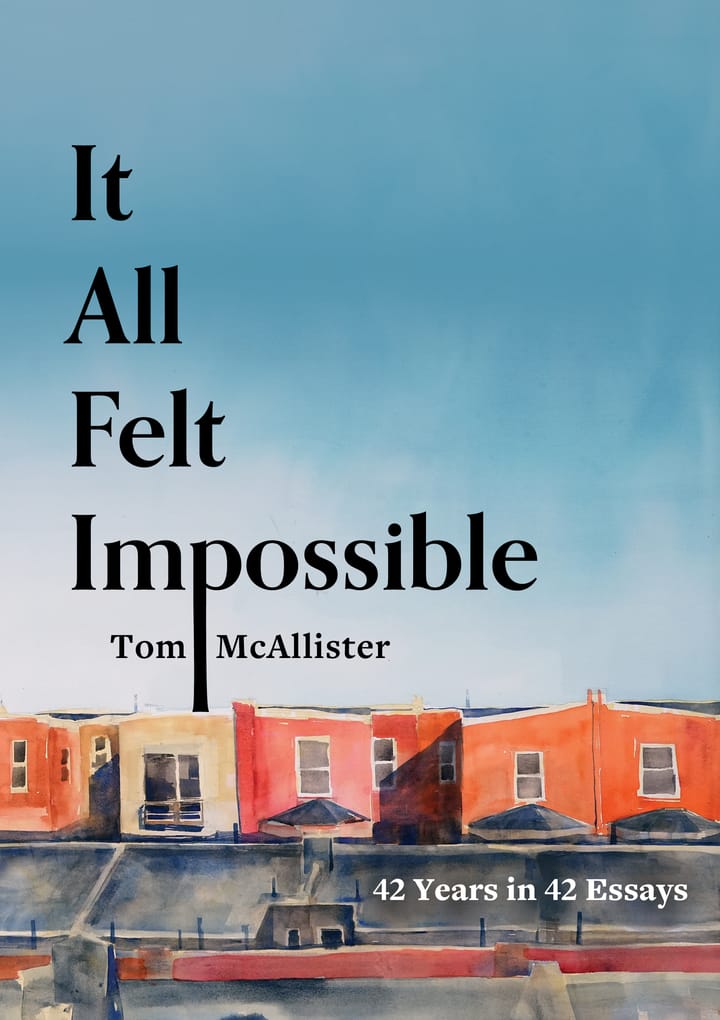Questions for Substack
Follow-up questions about Nazi "ideas" for Substack's founders, and contemplating the future of The Reframe.

It’s the Christmas season, which the movie Love Actually informs me is a time for telling the truth. Also, according to the same movie, it is a time to propose marriage to your housekeeper whose language you don’t speak, and to tell your best friend’s wife that you’re in love with her, and … you know what? I’m not going to get into turn-of-the-millennium comedies right now. I’ve got other fish to fillet.
The holidays are also usually a time when I pull the plug on writing weekly newsletters for the rest of the year—aside from the (upcoming) quarterly shake-the-tip-jar post—and I was really feeling the need for the break this time. I’m tired, man. Life is busy and the news is pretty bad pretty much all of the time, and the cost of awareness sometimes feels higher than what I have in my emotional piggy bank. As proof of my fatigue, the last newsletter contained a passage that was just lazily reductive in a way that I hope is not characteristic of my writing (and my thanks to those who pointed it out). There were also at least three sentences to which my post-hoc copy editor Josh could only reply what?? so I think a little break to recharge the batteries is in order.
But now I guess I need to briefly (hopefully briefly, dear sweet 8-pound-6-oz baby Jesus¹ please let me write briefly just once on this the week of your birth) address the goose-stepper in the room; “the room” being Substack.
I’m publishing a book of essays, and my readership is helping me do that. If you want the details on how you can get in on that and get a signed copy and my thanks in the acknowledgements, click this link.
(If you do not want the details on how you can get in on all that, click this link instead.)
About a week ago I co-signed an open letter, along with some dozens or maybe hundreds of Substackers, addressed to Substack’s founders. If you’re reading this, you probably saw it. If not, check your spam filter or the archives.
This letter was organized by journalist (and fellow Substacker) Marisa Kabas, in response to journalist (and fellow Substacker) Jonathan Katz’s story in The Atlantic that shows that Substack—which is extremely good at helping writers organize an audience of readers—has Nazis among its users. The Nazis are expressing straight-out Nazi propaganda and incitement, as Nazis do, but now they are monetizing and organizing on Substack. It’s a tiny fraction of the overall platform’s ecosystem but it’s more than the zero you’d want. As anti-Nazi people who are also creators on the platform, we co-signers thought that this was dangerous, especially in a time of rising empowered fascism, and it disturbed us. Nazi propaganda should be in violation of any useful terms of service, and we explained this, and requested an answer as to what would be done about it. Our (or at least my) trepidation was compounded by Substack’s existing pattern of promoting and platforming proponents of bigotry (particularly transphobic bigotry) who are somewhat less overt than Nazis, and by “somewhat less” I mean only slightly somewhat less; Substack founder Hamish McKenzie recently hosted the mainstream white supremacist blogger Richard Hanania on his podcast, and go here or here if you want more about that guy’s whole deal.
Anyway, McKenzie wrote a response to the open letter, and it was pretty much what I expected. Here it is if you want to read it.
Key passage:
I just want to make it clear that we don’t like Nazis either—we wish no-one held those views. But some people do hold those and other extreme views. Given that, we don't think that censorship (including through demonetizing publications) makes the problem go away—in fact, it makes it worse. We believe that supporting individual rights and civil liberties while subjecting ideas to open discourse is the best way to strip bad ideas of their power.
In short: yes, we do have Nazis. No, we won’t be doing anything about it. Please feel free to take a flying fuck at a rolling donut. Please feel free to piss up a rope and then climb it.
It’s the “sunlight is the best disinfectant” game. It’s the “marketplace of ideas” game. I don’t want to spend too much time explaining why this is nonsense; I’ve done that at length elsewhere. You can find an example in this essay from earlier in the year, which features this quote:
…so many people who insist that “sunlight is the best disinfectant” for bigotry—by which they mean that bigotry should be allowed to expose itself, and thus be shunned by a public that won’t tolerate bigotry—also seem to insist that every instance of a bigot getting publicly shunned after exposing their bigotry represents a very dangerous trend for free speech, while simultaneously never seeming to object to any of the actual attacks on freedom—of speech, of movement, of bodily autonomy—that are happening across the country.
At a certain point, it seems to me that what such people are actually advocating for is not to use sunlight to expose and disinfect our society of bigotry, but simply to have a society in which bigotry is free to dance in the sun.
Before preceding we should mention what “Nazi ideas” are, since McKenzie didn’t. “Nazi ideas” are: first, that people Nazis consider part of their ethnic and philosophical in-group represent pure paragons of humanity; second, that all other human beings are corrupted and corrupting threats poisoning their bloodstream both literally and metaphorically; and third, that all other human beings therefore should be subjugated, then expelled, then exterminated, so that true humanity can finally thrive. They have other ideas as well, but those make up the core. If you want to hear examples of Nazi ideas, you should listen to the leader of the Republican Party, whose name is Donald Trump. He’s saying stuff like this all the time, and his crowds cheer and cheer, when, that is, they aren’t claiming to be opposed to antisemitism and other forms of racism and bigotry and supremacy and suppression.
The notion of a marketplace of ideas selecting the best ideas and rejecting the worse ones is interesting. It suggests that marketplaces always select for quality, especially the more unregulated they are, which is not something I’ve noticed to be true about how any actual marketplaces operate.
The idea that Nazi “ideas” need to be defeated in open debate, which will cause them to lose power, is also interesting. It presupposes that debates are always won by the most correct idea, which I’ve noticed is often the opposite of how debate works.
It also suggest that the Nazis’ plan is to participate in bloodless debate over their ideas, and accept the outcome if their ideas are rejected, which is not a plan I think Nazis have ever pursued, or the sort of arena in which they have ever admitted—much less accepted—defeat.
It also suggests that what Nazis have are “ideas,” when we know that what they actually have are intentions, and those intentions always create real-life violence toward marginalized communities along racial, ethnic, religious, and other lines of bigotry—and they do so the more effectively Nazis are able to gather and organize and promote their “ideas” into the mainstream.
Most damning of all, it also smuggles in the idea that—in the mind of the person making the suggestion, at least—Nazi ideas haven’t been effectively defeated in the marketplace of ideas yet. Apparently Nazi ideas are still valid and worthy of consideration, and need to be debated some more before they are to be considered defeated.
So I’ve got some follow-up questions for Hamish McKenzie and the rest of the “open debate” crowd, to test their hypothetical:
- Which Nazi ideas do you feel have not already been adequately considered? Can you mention an example of a Nazi group coming to power specifically because their ideas were not being accommodated and even promoted in mainstream platforms?
- Which Nazi ideas have been improperly thrown out, and what damage do you think has been done by not considering them? Can you mention an example of a Nazi group that came to power specifically because their access to public platforms were denied?
- How good at debate do the targets of Nazi ideas have to be in order to earn the right to stay alive, and for how long will they need to be the best at debate? How many debates must they win against Nazi proponents before we can consider Nazi ideas sufficiently defeated?
- When have Nazis ever gone away because they lost a debate? If Nazi ideas win the debate, does that mean they were the best ideas? What ideas do you suppose will be allowed to remain in the marketplace if that happens?
- Can you expand on what your plan is to “strip bad ideas of their power” by exposing them to public debate through Substack? For example, how do you feel Richard Hanania was “stripped of power” by being interviewed by you on Substack’s platform? Can you name a Nazi or other supremacist who was stripped of power by using Substack to gain money and followers? Does Substack strip power from any other users on any other topics? When does this power-stripping take place, exactly? At renewal time?
These are rhetorical questions. Just asking them reveals the truth, which is that the effect of keeping hateful ideas in perpetual circulation doesn’t defeat them, but rather simply keeps them in circulation. Just asking reveals the truth, which is that mainstream platforming of the “ideas” of Nazis and other supremacists doesn’t defeat them, but rather makes them mainstream. Just asking reveals the truth, which is that mainstream platforming assists the bully’s agenda of always expanding the margins of permission, expanding the definition of what violence will be deemed debatable, and therefore acceptable, toward those against whom they intend violence and elimination.
These are things so obvious to say that missing these things seems to require a certain willful ignorance, or even a deliberate desire to miss it.
I guess I wound up explaining at length after all. Oh well.
Anyway, that’s Hamish McKenzie’s and therefore Substack’s answer. This is disappointing and frustrating, though not surprising. Substack has taken similarly garbage positions and chosen to elevate similarly bigoted voices before.² And some will probably tell me I should have known better, specifically because of this reason. Probably so. It won’t be the first time I should have known better, that’s for sure. I hope it’s the last, but it probably won’t be.
So the question before me now is, what’s next?
The short of it is, I’m not sure yet, but I’ll be exploring options, and as much as I do not want to migrate yet again, leaving for another platform is definitely on the table for me.
If you asked me right now, I would tell you I am strongly leaning toward leaving.
I guess I didn’t need you to ask. I guess I just told you.
These are the customer-forward services the whole team provides you here at The Reframe Corporation Inc., LLC.
I want to be as transparent as possible: staying on Substack is still on the table for me, too, even if I’m not leaning that way at the moment. There are reasons to stay.
Many anti-supremacy creators will likely opt to leave, but some will opt to stay: professional creators who (unlike me) depend on their newsletter for most (or all) of their livelihoods, for whom moving is a very scary matter, because the reality is that Substack is the most viable option and the place where the most people are, and writers need readers.³
Content creators came to Substack because the site is good at building audiences, and along with their audience they built something valuable with their skill and hard work. I know they don’t want to compromise what they’ve built. The fact is that any migration risks breaking what I’ve built with you if it’s done badly, or too clumsily or too swiftly. The safest thing for each creator is probably to make their own private sites, but that would involve learning skills most don’t currently possess, or hiring them made with money most don’t currently have. This is why most of us chose Substack—a stable and effective site, and the most prominent available option by far—in the first place. Writers go where readers gather. This is where readers gather.
These who will remain will no doubt include some who are (unlike me) actually directly threatened by Nazi intentions for this country. So, just as I’m not looking to any other creator to inform my own decision, so also I don’t blame anyone who stays, even if I do go. Sometimes the ability to leave is a privilege, and I don’t intend to forget that.
But I relate to being worried about losing what I’ve built. I’ve worked very hard on these essays this year, and on building this readership. A lot of you have taken the time to tell me how much my work has meant to you, and it keeps me going. I want to continue that work, so as a practical matter I want to be deliberate and careful, because most of all, I really value all of you who bestow upon me the unbelievable honor of reading what I write.
So, like other creators, I very much hope you stay with me as I work this out.
I’ve always hoped I could make a living as a writer, but it never seemed like more than a dream. I’m not there, but this year made me dare hope it might someday come true. Look: I’m not owed a writing career, nor would my writing career be anywhere near the top of the list of things most threatened by rising fascism, nor would it be the thing I’d ask anybody to care about more than the lives of people who are directly threatened by my country’s looming christofascist Nazi menace, but it is still a concern of mine—you might even call it a fear—and I want to be honest about that.
I’m also just pissed off. Yet another really effective site has been holed below the water line by its own owners, who hold the most common and popular shitty notions of modern tech-lords and their shitty blinkered venture capital bros. I’m skeptical of any other viable site’s ability to not already be similarly compromised, or to eventually become so. And, as previously alluded, this whole country is getting pretty damn Nazi-normalizing these days, as our Hitler-quoting former president and almost-certain Republican nominee demonstrates. Democratic leader Chuck Schumer’s response to the Hitler quotations was basically “yeah but hey the guy has a point about the border,” so holy shit, if that’s the best the opposition party has got, it seems like Nazi adjacency just might not be optional anymore no matter where you are.
And that’s what Nazis want: to be everywhere, so that you can’t go anywhere.
This most of all: making everybody else leave whatever spaces they enter is exactly what Nazis demand and expect, and they have a clear pattern of going to any platform where people of good intent congregate, in order to chase them out, to splinter communities, to position good intent as fringe and themselves as mainstream—which allows them to move out the margins of permission on the violence they intend.
I’m not harboring any delusions that if I stay I’ll be “fighting the Nazis” (or for that matter that if I leave I’ll really be sticking it to Hamish McKenzie and the rest of Substack’s leadership, who clearly don’t care either way and have decided they’d rather have Nazis than anti-Nazis on their platform), but I do have a defiant and oppositional streak that looks at Nazis moving in and says “go to hell, I’m not moving—you move.”
As a wise man once said:
Why should I have to change? He’s the one who sucks.
That’s right. I’m quoting a Bolton. Some would say the best one.

So that’s part of what I’m feeling. Part, but not all.
There are very good reasons to leave, too.
It would have probably been easier to just ignore this and let this present controversy pass, but aside from the fact that it runs counter to my general philosophy, I don’t think ignore-ance is very practical or wise. Eventually the truth will tell. The site’s decision is the latest revelation of a strategic trajectory based on anti-human lies, and lies tend to make an unsustainable foundation. Again, this isn’t the first such decision Substack has made; it’s just the latest one. And now that Substack has made it clear that Nazi talk and organizing doesn’t violate their terms of service, it seems doubtful this will be the last time that Substack does something that makes people of good intent want to leave. I think this site will eventually become untenable. I think this chosen trajectory will probably eventually make Substack an impossible place to grow an audience and monetize it, at least if you want the sort of audience that I want to cultivate. I’ve got a strong sense that I may as well rip off the band-aide now than wait.
Ultimately, the site is monetizing Nazis, and it knows it. At best, it doesn’t give a shit; at worst, it actively wants to monetize Nazi rhetoric. I don’t accept that. And ultimately, the thing about things you find unacceptable is, you can’t accept them.
That’s why I think that 2024 will probably be a year of moving for The Reframe. I’ve been peeking at Ghost, and I’ve been peeking at Buttondown. I’ve joined a list of open-letter signers contemplating exodus, and perhaps something coordinated in tandem for maximum impact. There are probably other places I should look at, and I’ll look at them, and hopefully choose better this time.
I want to be very clear about the fact that I’m not going to rush this—either the decision or the move. If and/or when I migrate off of Substack, it may be quick and easy, but I suspect it’s going to take a decent amount of time⁴ to make sure I am doing it right. If it does, I intend to take that time. The other sites claim that moving is push-button, a matter of minutes, and hey let’s hope so! but Substack also advertised the same thing, and that move took weeks of effort and then more weeks of learning the new platform. Right now I don’t have weeks. I’m trying to put out my book, and I have a job that requires and deserves my time and attention, and I have a family and a life, and I still want to keep writing The Reframe, and sometimes those seem like excuses to me, so maybe those sound like excuses to you, but they’re also realities. I’m not begging for sympathy, but I only have so many hours in the day.
Hence, I’ll be asking for your patience. I really hope I have it.
So in the near term, as I figure it out, I will still be posting on Substack. If you need to leave, that’s understandable, but my hope is that you’ll be patient as I do that work.
Here are my requests for you:
If you value my work enough to want to support it but can’t bring yourself to pay Substack, there are links a few paragraphs down, on the other side of the horizontal line, that will help you do that.
If you are currently already subscribed, especially annual subscriptions, I would recommend you just keep your subscription, because I suspect your migrating away to Paypal or Venmo etc. will make the process of migrating payments to a new platform more challenging.
But ultimately, you gotta do what you gotta do, and whatever you do I still love you very much, as far as you know.
And now, to the owners of Substack, who have decided to make their lovely and effective site potentially untenable, here’s an open “screw you” offered on the marketplace of ideas, in response to your horseshit dishonest open reply to our honest open letter; for taking the most intellectually vapid position possible and then positioning it as a virtuous principal; for confusing standards with censorship; for dodging your moral responsibility as an owner of a platform to regulate it to limit deliberate violent threats against marginalized people; for abdicating your responsibility to fix the problem you created and making it something the targets of that threat (and also your users) now have to pay for.
Put that in your Christmas stockings, you purposefully ignorant dorks.
Happy New Year.
The Reframe is supported financially by about 5% of readers.
If you liked what you read, and only if you can afford to, please consider becoming a paid sponsor.
Click the buttons for details.
Looking for a tip jar but don't want to subscribe?
Venmo is here and Paypal is here.
A.R. Moxon is the author of The Revisionaries, which is available in most of the usual places, and some of the unusual places, and is co-writer of Sugar Maple, a musical fiction podcast from Osiris Media which goes in your ears. That time then, and once again he’s bouncing around the room.
¹ Every time I think I’ve gotten away from references to turn-of-the-millennium comedies, they pull me back in.
² A lot of these voices can be found as signatories on a competing open letter, which equated a hypothetical decision to deplatform Nazis to effectively be “Substack deciding what we can read.” This framing is obvious nonsense; there are places to read things other than Substack, and every site (including Substack) already has terms of service and deplatforms violations against those terms. The competing letter went on to point out that Substack allows creators to curate what they (and, to an extent, their readers) see on the platform, which keeps the Nazi voices sequestered to their part of the platform, and this may be true enough for now, I suppose … but it ignores the substance of the complaint, which is that Nazi rhetoric represents violent intent. It also runs directly counter to McKenzie’s rationale, which is that making Nazi voices as visible as possible is the best way to defeat them. Even though this letter’s point contradicted his point, McKenzie linked to the open letter in support of his rationale, and some writers of the open letter praised McKenzie’s response, which to me suggests that for many parties, the guiding light in the decision to leave Nazis platformed was the outcome of platformed Nazis, not the rationales for doing it.
³ Which is why Nazis want to be there, and why the decision that their “ideas” don’t violate Substack’s terms of service is so corrosive.
⁴ And forcing people to waste their time having to deal with the bad choices they pose is another key tactic of Nazis and other supremacists, and another primary reason that they seek to be platformed in mainstream spaces.




Comments ()